#i have no idea whether that was an intentional reference (a sort of twisted mockery of how that scrubbed and polished portrayal of history
Text

Captain Francis Crozier, at Furthest North.
#the terror amc#francis crozier#my art#can't believe it took me 2 rewatches AND getting refs for this to realize it's the hungarian state opera house. girl i was there last month#anyway yeah i was looking at gifsets of the last shot of the show and feeling nauseous with emptiness etc etc when#the thought struck me that it looks an awful lot like the tableau vivants from the ep1 flashbacks in its stillness#i have no idea whether that was an intentional reference (a sort of twisted mockery of how that scrubbed and polished portrayal of history#contrasted with the deeply sad and inglorious reality#or some sort of meta about storytelling itself. i'm not really smart enough to say lol) but i made this anyways. enjoy#pattern recognition go brrrrrrrrrrrrrr#i bent over backwards trying to make this symmetric and harmonious. it isn't but if i don't post it now i never will
1K notes
·
View notes
Text
Taishō Trilogy of Seijun Suzuki

As a salaried director at Nikkatsu, Japanese filmmaker Seijun Suzuki has been making crime movies for decades. He has directed around 40 movies from 1956 to 1967, of which Tokyo Drifter and Born to Kill are considered the most acclaimed. In a later attempt to reignite his career after splitting paths with Nikkatsu and veer off to the new ways of expression and stylistics, Suzuki started working on surrealistic feature film Zigeunerweisen becoming the first part of unformal Taisho Trilogy: Zigeunerweisen, Kagero-za, Yumeji. The three films are not linked with any similarities in the plot but set in the same period of emperor Taisho ruling the nation. It was the time of 1920-1930s. All films resemble hectic dreams and bear unmistakable visual similarities. The films have been meant to create the new stylistics for Suzuki developing his old strife to produce the shots of supreme beauty to strike not less than Godard’s shots used to do. Taisho Trilogy is an example of films lacking the coherence, yet remaining unforgettable with their quixotic and wild visuality.
Zigeunerweisen (ツィゴイネルワイゼン) - 1981
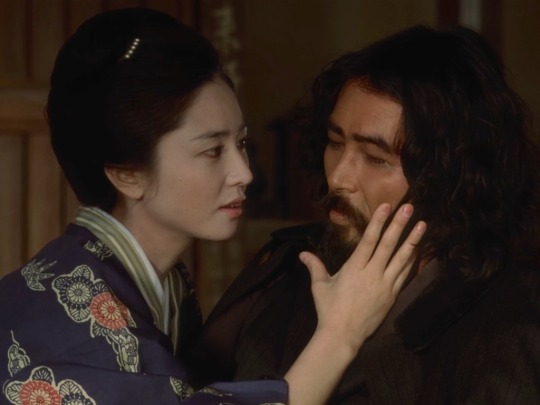
From my point of view, the best way to get a glimpse in the Taisho Trilogy is to watch the last part of it Yumeji. The last film encapsulates all the achievements of the trilogy. Comparing with Yumeji, Zigeunerweisen is almost impossible to comprehend. The film employs riddles in abundance, and the hints given can unlikely help to solve quite a few of them. In a surrealistic way, Suzuki’s tale shows the relations between two former co-workers Nakasago (portrayed by Yoshio Harada) and Aochi (Toshiya Fujita) who developed affairs with the wives of each other (at some point, Nakasago even suggests to exchange the wives). The story is ambiguous and not very coherent as Suzuki doesn’t bother himself to show the things in any sort of logical way or order.
In fact, the film is set in several dimensions, and it never becomes clear whether Nakasago has died or not, and whether Koine and Sono (both played by gorgeous Naoko Otani) are the same women or two different. We don’t really get a clear idea of why Nakasago killed a woman and if he actually killed her or not. The behaviour of a spooky girl also remains mysterious and unclear. Is she sort of ghost or she has bridged some spiritual connection with the world of death? We never learn it for sure. Moreover, we don’t even know where is the reality or dream or fantasy. Suzuki does his best to confuse the viewers with his surrealistic images and bizarre storytelling.
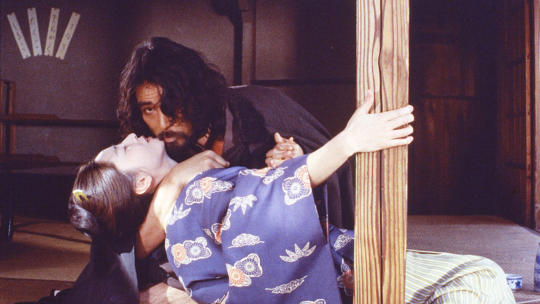
What we know for sure, is that Zigeunerweisen is the title of a vinyl record that Nakasago and Aochi used to listen. It has some gypsy tunes on it. Somehow, the record is used as the spiritual connection between Nakasago who dies and the outer world. Also, there are some references making to think Suzuki paints some ties with the political situation in Japan in the 1930s. The blind kids might symbolize of Japanese right forces getting insane prior to invading Manchuria (though, it is too obvious for Suzuki to be entirely sure that was an original intention). There is also a connection between the fact that Aochi is a German language professor, the relations of Japan and Germany and the title of record taken from German - Zigeunerweisen. And once again, this is just a guess as it never becomes clear what the author implied.
Suzuki uses Aochi as a sort of symbol of his audience: a confused man is trying to follow the story and understands very little from his friend’s behaviour. The ending is bizarre just like the whole movie, and we are left with no answers, as well as Aochi. However, giving the answers is not something the film has been made for. This is entirely visual work, and it is drastically important to pay attention to the shot, mise-en-scène, camera work and usage of light. Zigeunerweisen is a visually appealing film, and many shots are just like gorgeous paintings we enjoy. The matter of greatest importance for Suzuki was to fully realize and utilize his potential in elaborating the exquisite ways of artistic impressions. Making Zigeunerweisen, he made up his mind for creating a fresh visual language. He comes up with the material which is confusing, but it goes without a doubt Zigeunerweisen can be hardly compared to anything else. Watching Zigeunerweisen, at some point you realize there is probably no way to twig what is real and what is just irony, mockery, dream or fantasy. Nevertheless, the visual style is so solid and brilliant that it starts seeming the only way to accompany the frantic twists of the plot which remain spooky and incognizable just like the vinyl record or tunnel we see several times in Zigeunerweisen.
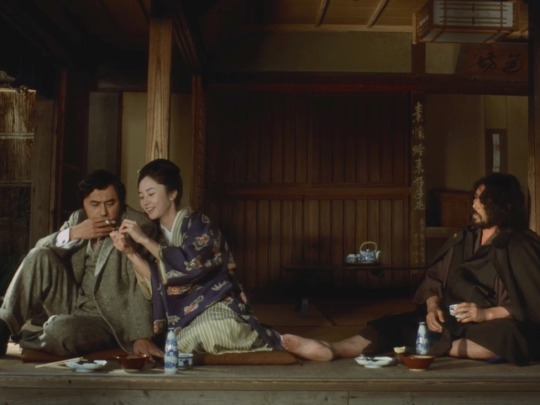
Kagero-Za (陽炎座) - 1981
The second film of Taisho Trilogy clarifies several points I remained dubious about after watching Zigeunerweisen and Yumeji. This trilogy is an example of substantially visual cinema where the logic and storyline are abandoned, in order to prioritize the importance of the mood and shocking stylistic beauty of the shots. Seijun Suzuki used to say “I make movies which make no sense and no money”, and this is true. Watching Zigeunerweisen, I was struggling to understand where do the twists of plot and expression lead and what is the idea behind it. Kagero-za or Heat-Hazed Theatre makes it transparent there was apparently something Suzuki implied, but it would remain incognizable as there are numerous ways to interpret the tale.
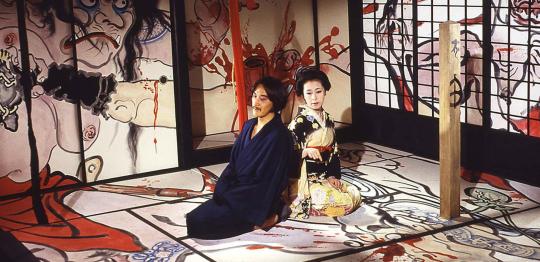
Kagero-Za is another psychological surrealistic tale in this trilogy. The plot is a formality as it never gets too clear. We follow the story of playwright Matsuzaki (portrayed by Yusaku Matsuda) who encounters his different mistresses, one of whom appears to be the wife of rich businessman Tamawaki (Katsuo Nakamura) who wants protagonist dead. Heroes pass away and appear again. In Zigeunerweisen I was still wondering what that supposed to mean, but with Kagero-Za I realized these are the actual fantasy ghosts who might bear symbolic meaning. The protagonists talk in one location, and in the next shot show up somewhere else. They jump from topic to topic, the dialogues are bizarre making both conversations and plot incoherent - though, this is something Suzuki has been trying to achieve.
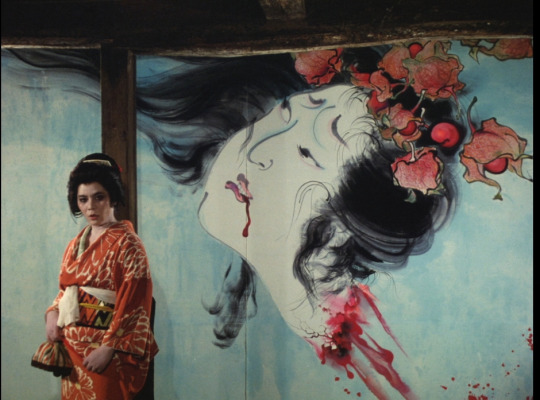
Kagero-Za resembles a deranged dream or plot of a kabuki play. At some point, we actually see the events might be nothing but the new play of Matsuzaki who is seeking for the new story. We see awkward scenes on the theatre stage, and playwright observes them too. Perhaps, the whole story is like that - just a fantasy of Matsuzaki told in a surrealistic way.
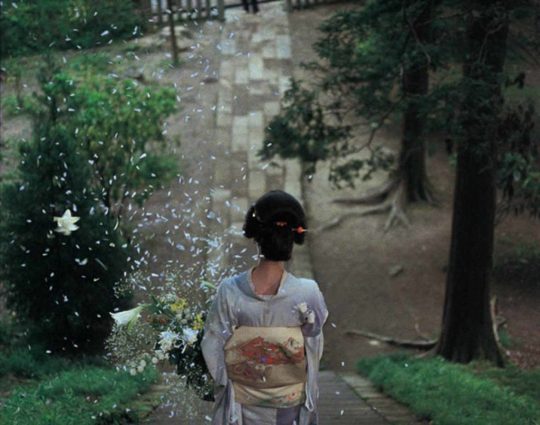
What is Suzuki brilliant in is coming up with the fresh ideas of his shots. Dozens of shots require studying and might be considered art objects. The usage of vivid traditional paintings Suzuki employs is striking and spectacular, making the film’s visuality pretty impressive. Camera work and montage also follow the lead of Suzuki’s bizarre visual code. Again and again, Suzuki creates mise-en-scene of stunning beauty. The scenes and shots are often not linked to each other with any sort of explanation, but they are perfect with no respect to the story. Kagero-Za is not a film of non-linear plot and not a non-plot film either. It is an attempt to reject any sort of dictate created by traditional view on the films and necessity of coherent plot and background. Highly experimental and visually appealing work of Suzuki is meant to make neither sense nor money. But the aesthetics of Suzuki should be acclaimed as something rare and remarkable. This aesthetic will lead him to the third and last film of the trilogy Yumeji which I regard as the best part of Suzuki’s surrealistic Taisho films.
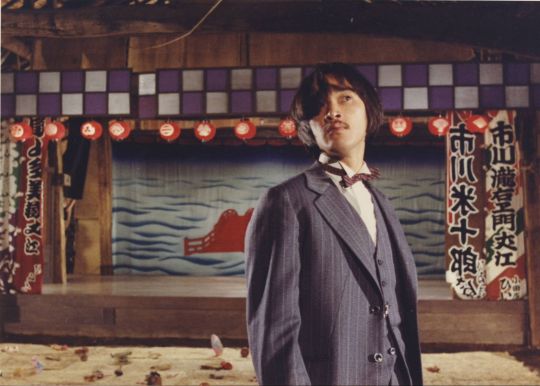
Yumeji (夢二) - 1991
The last film of Taisho trilogy in a very surrealistic tone tells a story of Japanese painter and poet Takahisa Yumeji (1884-1934) encountering several mistresses and his rival artist Gyoshu Inomura who is arguably more talented than Yumeji (portrayed by Kenji Savada). Throughout the account on the screen, we get a glance on the psychological and art struggles of the painter who is seeking the perfection and inspiration for his paintings.

The tantalizing tale is enhanced with numerous surrealistic forms, characters, images and entire scenes. It is also impossible to follow the stream of the tale before we get an idea we bump into the artistic fantasies of Yumeji, and the line between the death-life and reality-fiction is painted by Yumeji himself. The bizarre work of camera moving from the left to the right, and back again and showing the scenes with unusual composition and angles illustrate this far-fetched definition of different dimensions which unite and mix up in Yumeji’s mind. The story contains both surrealistic scenes and detective-like motif, though It is not entirely clear whether Wakiya (played by Yoshio Harada) has been actually murdered or not, and it is unclear if the whole story ever took place in the reality. The endless riddles bridge the gap between Suzuki and Buñuel with Robbe-Grillet.

What is certain is that the film tells about Yumeji’s perception of the art and women which are pretty much related in his life. There is no mood for art without passion Yumeji chases women with. He encounters the most beautiful ladies and seduces them, but he doesn’t love them in a human way. His fetish is about their postures, outfits, behavoiur is utilized for the ideas of paintings, and the women’s beauty for him is nothing but inspiration for art and poetry. He feeds himself on their boundless sexuality and allure like a vampire, and he is so addicted to their beauty that women, in fact, define his art. We see Yumeji is in the relationships with a woman who loves him, but the artistical mindset makes him seduce the other women as potential models or nudies.
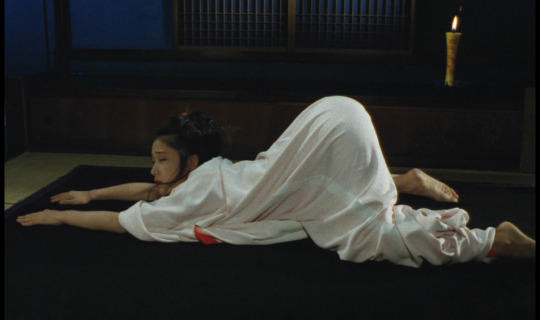
Seijun Suzuki shows the gorgeous women and their perfect bodies in abundance to immerse himself and viewers in Yumeji’s fetish (and probably the director’s fetishism as well). The scenes with Tomoyo (played by Tomoko Mariya) and Hikono (Masumi Miyazaki) are charged with the enthralling sexuality the female protagonists radiate. They are frequently shot as the paintings, and this images strike with the boundless beauty Yumeji and the viewers fully immerse into. This is a very sexy and surreal fantasy which resembles Alain Robbe-Grillet’s L'Eden et après in an artistic way and Trans-Europ Express by the manner of storytelling. The usage of aggressive montage and dense colours reminds of the style of La Chinoise by Jean-Luc Godard.
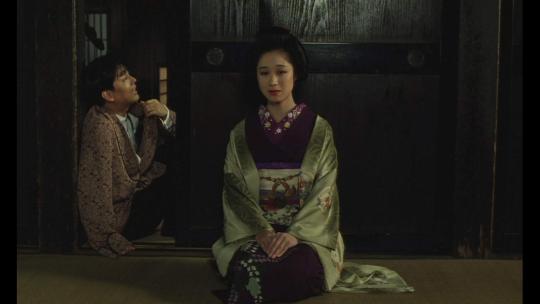
To sum up, Yumeji is a set of fetish fantasies made like a collection of his paintings he could have possibly completed. Every shot is like a painting where mise-en-scene stuns with beauty and bizarre mesmerizing power. The story is hard to follow and riddles might be very confusing, but it can be interpreted in many ways. Yumeji is important and striking as an art object and surrealistic experiment, yet there is probably no way to delve too deep into the film: it is much better to enjoy the sophisticated shots and the beauty of Yumeji’s mistresses portrayed by Tomoko Mariya, Masumi Miyazaki, and Reona Hirota. The last but not the least thing is the usage of music. This is the film Shigeru Umebayashi has written his brilliant and sublime music theme Yumeji for. Later the same theme would find international acclaim after being remarkably used in the film of Wong Kar-wai In the Mood for Love.
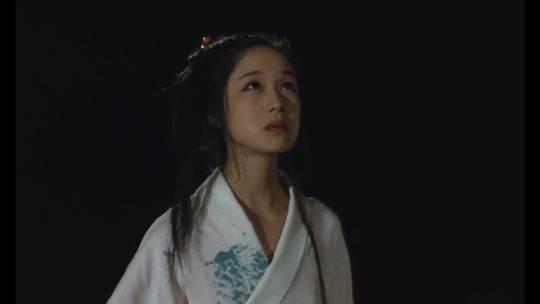
#yumeji#seijun suzuki#鈴木 清順#takehisa yumeji#tomoko mariya#masumi miyazaki#Kenji Savada#kagero-za#zigeunerweisen#taisho trilogy
23 notes
·
View notes
Note
⭐️Can you please also do a director's commentary for "Foundations" chapter 3? Thank you for your commentary on ch. 2, that was fantastic btw, :D I love that chapter!!
Yes! Thanks for asking! Link to AO3.
I used to write such short chapters, haha. This one is under 2500 words! I talked a bit when I did chapter 2 about why I wrote Foundations. Chapter 3 was actually the first chapter I wrote. It was The Scene (you know, the one you see in your head that’s the whole reason for writing the thing in the first place) for this fic, but when I write, I usually write The Scene first, haha.
Loki shifted in his camp bed, reaching up to pull the orb of light floating next to him closer before he turned the page of his book. Wind rattled the walls of the tent, but the storm outside wasn’t enough to drown out the rising and falling swells of sound from the impromptu feast that had sprung up several tent rows over.
I remember really struggling to get the atmosphere of the setting of this chapter...mainly because I didn’t really care that much, haha. I wanted to write a fraught conversation between Loki and Thor and what to you mean I need to describe where they are? Though I actually think it turned out well in the end.
He paused for a moment, listening, knowing the right thing to do—the expected thing to do—was to be there himself. Eating, drinking, bragging and inflating whatever deeds he’d accomplished in battle that day. And singing, apparently, if the sound he could hear was any indication—and if one was extremely generous with their definition of ‘singing.’
I don’t think I’d come up with my head canon yet that Loki hates to sing at this point.
They were on Alfheim, one of the Nine Realms, which was facing a minor insurrection; nothing that Asgard’s forces couldn’t put down in a week or two.
Sneak peek! Alfheim features prominently in the sequel to The Real Asgardians of the Galaxy.
They’d been there three days and the tide of the war was already turning in their favor. Still, it had been a shock when the Bifrost had brought them there. Years ago, Mother had taken Loki and Thor to visit, and Loki had found the planet breathtaking. Asgard was beautiful, of course, the pinnacle of the Nine Realms, but the lacy architecture of Ljosalfgard and the forests twinkling with lights was captivating. Thor had wanted to capture a unicorn and ride it;
I draw a lot of inspiration from the comics when I write about Alfheim, since we’ve only seen one very brief shot of it in the MCU. Ljosalfgard is the capital (Ljósálfar is Old Norse for Light Elves). Unicorns are native to Alfheim in the comics.
Mother had forbidden it, and added for good measure that if he was gored, he’d have to sit in bed for the duration of the trip and wouldn’t be allowed to have any fun.
The forests were nowhere to be seen now, though. Or the unicorns, for that matter, though during that long ago visit, neither Thor nor Loki had gotten anywhere near one, anyway. The rebel army was moving towards Ljosalfgard, burning everything as it went, and the tall, graceful trees that had fascinated Loki as a child were nothing but smoldering stumps now. Whole towns had been reduced to rubble, with the bodies of those who had been unable to flee lying amid the wreckage.
In the last such ruin they’d passed through, Loki had stopped to stare down into the face of a dead elf. Her legs were pinned under the collapsed wall of a building, crushed beyond repair, but what had killed her was the discharge weapon that had been fired into her stomach. Tarry blood, turning black as it dried, was spread around her. Not a quick death, or a painless one. He’d knelt down and closed her eyes, but he couldn’t do anything about the howl of pain that twisted the rest of her face.
I added this paragraph about the dead elf during editing, feeling that my description of war was too impersonal and sanitized. Since writing this, my body count in my fics has multiplied. Now I kind of look for excuses to describe corpses.
A crack of thunder brought him back to the present with a jolt. He realized he’d been staring at the same sentence on the page, reading it over and over again.
Mood, Loki.
With a yawn, he closed the book and set it aside on the small, ornate table he’d carted to Alfheim from Asgard.
My pocket dimension head canon wasn’t as well developed at this point. I was imagining the table physically being carried. I’ve actually always intended for this table to make an appearance in my fic again, like Loki chucked it in his pocket dimension and sort of forgot about it, but I try to limit the amount of Asgardian stuff he’s got in there for angst value, so I’ve never had it show up again.
The book was a treatise on astral projection, wherein the author theorized that with the proper source of power, the range of the projection could be amplified infinitely.
I still think this is clever, haha. This is a reference to Infinity Stones! Specifically the scene in Avengers where Loki astral projects and talks to the Other. I head canon that Loki really can’t astral project very far (maybe, maybe, a mile or two), but that the Mind Stone allowed him to do so in that scene.
Interesting, but not the lightest reading after a day of battle. He’d brought other books—and been roundly mocked for it
Whether Loki was being mocked or teased is open to interpretation. He can’t see it as anything other than mocking, though.
—but his focus was shot to hel. Whatever he picked up, he’d only end up sitting with it open on his lap while his mind wandered.
At that moment, the tent flap burst open, letting in a spray of wind and rain. “It’s pissing down out there,”
The fact that Loki and Thor both have English accents makes me desperately want to make them speak British English, but I don’t because they don’t in the movies. Sometimes, sometimes, I allow myself to throw something in.
Thor said, apparently to no one in particular, because when his eyes fell on Loki, he added, “Ah. I thought I’d find you hiding here.”
“I’m hardly hiding,” Loki said. “Anyway, I was tired.” He flicked his light orb higher and expanded it with a twist of his hand so that it illuminated more of the space.
This is the first time I wrote about this spell of Loki’s, which I now use alllll the time. It’s one of my go-to spells for him. If you’ve followed me for any length of time you’ve probably seen me talk about this fic I have where Strange goes into Loki’s mind (still unposted)—this spell is actually a major part of one section of that fic.
Thor looked at it, shook his head a little, and switched on the lights on his side of their shared tent. “What?” Loki asked, raising an eyebrow.
Generator? Asgardian tech? Who knows!
Glancing at him, Thor replied, “Tricks.”
Uh oh.
With a slight smile, Loki said, “Correct me if I’m wrong, brother, but one of my tricks prevented an axe from lodging in that thick skull of yours earlier.”
Thor snorted. “Not so tired that your wit’s dulled, I see.”
“Well, no. Never.”
Obviously, I try to capture the characters’ voices when I write, especially their dialogue, but I do it to the point where if there’s a kind of really distinctive delivery of a line, I’ll take that and turn it into almost like, a verbal tic? You know how you’ll catch yourself saying certain things a certain way, little phrases, that sort of thing? This is an intentional echo of Loki’s line in Avengers, where Thor says, “You think yourself above them,” and Loki responds, “Well yes.” I use this one all the time.
Removing the vambraces from his forearms,
The amount of time that I have spent looking up what different pieces of armor are called, UGH. And I never remember. When I edit, I always have to double check. The only one I know for sure now is demi-gaunts because I use it so often, haha. Those are the things Loki wears on his hands in Ragnarok.
Thor chuckled, then said, “You should have joined us. No party is complete without your troublemaking.”
Loki put a hand over his heart, a grin twitching at his mouth. “I’m touched. I had no idea I was so appreciated.”
“That,” Thor said, “and the fact that Fandral couldn’t stop bragging about how many more rebels he slew than the both of us combined. I could’ve used your help knocking him down a peg or two.”
I wanted to show a few things here. One: Loki is used to Thor being dismissive about his magic, and he doesn’t actually dwell on it too much in conversation. Two: Thor’s attitude about Loki’s magic isn’t actually awful. He could certainly be nicer about it and have more respect for something that Loki is really good at it, but this isn’t something that Thor feels really affects their relationship. He’s mildly contemptuous, and he forgets immediately. And three: Thor enjoys Loki’s mischievous side. The two of them still have a decent relationship, though the cracks are showing.
“Mm. Sorry to disappoint you,” Loki said.
Thor snorted. Removing his cape and slinging it over a chair back, he asked, “What are you reading, anyway?”
With a glance at the book, Loki said, “I don’t think it would interest you.”
“I don’t think so either.” Thor smirked at him. “I’m just trying to show some interest in the things my little brother’s interested in.”
Rolling his eyes good-naturedly, Loki said, “Ah, I see. Mockery, then patronization. What a day.”
Thor chuckled and came over to pick up the book. “Astral projection,” he said, then looked at Loki. “You already know how to do this.”
Really trying to hammer (haha, pun intended) home the point that Loki is an extremely unreliable narrator. Thor asks Loki what he’s reading, then shows that he knows what Loki can do. And then:
Loki raised an eyebrow. It was always a surprise when Thor demonstrated that he knew what Loki was capable of.
Yeah but, is it, Loki? Is it?
“You already know how to swing a sword, but you still train.”
“Hm.” Thor put the book down. “Once Father gives me Mjølnir, I won’t have to.”
Still pre-Mjølnir.
Right. Mjølnir. It had been heavily implied, when Father had sent them to quell the uprising on Alfheim, that the reward for success would be Mjølnir. For Thor, of course. For Loki, well, he supposed the reward was the satisfaction of a job well done. Once, when they’d been children, the two of them had snuck down to the weapons vault to see if they could lift the hammer. Thor hadn’t hesitated; he’d strutted up to it and yanked on its handle. It had come off its stone pedestal easily, and Thor had crowed and brandished it while Loki had stood there grinning.
Then, Thor had set it down and said, his face flushed with happiness, “You try it!”
Loki had reached for the handle. But he’d stopped, his arm outstretched, and closed his fingers around nothing but air before withdrawing his hand. What if he couldn’t? What if he wasn’t worthy?
To this day, this bit hurts me. I find it so relatable. If you try, you might fail, so maybe it’s better to not even try? At least you won’t feel like a worthless failure that way. And on a broader character note, this is Loki as a child already feeling that he isn’t living up to expectations.
So he shook his head and had said, “Father will be angry if he finds out we came down here.”
This was a thin excuse to put off learning something about himself that he didn’t want to learn, but even at a young age, Loki had been all-too-cognizant of his own failings. Thor had looked crestfallen, which almost made him feel guilty enough to try lifting Mjølnir, despite his misgivings.
HE’S NOT THOR. This is something that I definitely address in my fic series, this idea that he’s not Thor, so he’ll never be good enough. And yes...it is something that he gets over. He stops worrying about the fact that he can’t lift Mjølnir. He begins to see the value in his way of doing things, and not in a defensive way, but in a way he’s actually proud of. He realizes he doesn’t need to be Thor because he’s Loki.
But this is waaaaaay before that, haha.
Almost.
Rain beat on the tent, which luckily was imbued with enough Asgardian technology to keep all of it outside. Winter on Alfheim, at least in this hemisphere. If the blood didn’t turn the battlefields to mud, the rain would. Loki glanced up, his brow furrowed, as thunder rumbled and a gust of wind made the canvas billow like a sail. “The weather could be better.”
“If it doesn’t stop, it will just make the battle more glorious,” Thor said.
Smirking, Loki said, “I think I find dry clothing more glorious than battle.”
Thor shook his head at Loki, looking like someone had just told a wonderful joke, but only he was in on it. “You enjoy it, admit it. You can pretend you’re above it all you like, but I see it in your eyes.” He paused, clearly wanting his punchline, or thesis, or whatever this was, to really land. “That’s the rage of battle, brother.”
This was the first bit of dialogue I thought of for this fic. I remember it coming to me while I was sitting in bed one night.
Loki somehow hadn’t expected that. Taken aback and hoping it wasn’t showing, he said, “You’re mistaken.”
[...] Thor chuckled and laid down, his hands laced under his head, but Loki remained sitting, staring at the opposite wall of the tent and fidgeting with his hands. The rage of battle. Ridiculous. If there was one thing that Loki was good at, it was not letting his emotions get away from him.
OOF. If you thought to yourself while reading this, That doesn’t sound like the Loki I know, then you are correct! Frigga has that line in TDW where she says, “So perceptive about everyone but yourself,” and that line is one of my guiding stars for writing Loki. He’s very, very good at reading other people...but terrible at knowing his own mind. And then his read of what other people think of him gets filtered through his skewed perception of himself.
Anyway, I very much believe that Loki is horrible about keeping his emotions in check. He absolutely, when agitated, thinks entirely with his heart and not at all with his head. Here’s the thing...
He was as collected in battle as he was any other time.
He wants to be a Good Asgardian. So in his mind, it’s controlling your emotions in battle that’s important. Other times? Not so much. As long as he does it in battle, nothing else matters. And Loki is very good about keeping his head in battle. He’s an amazing warrior, just as good as any other Asgardian.
To lose your head was to invite costly mistakes. Absently, he ran his thumbnail over his other fingernails. He feared losing himself, anyway. Sometimes he thought it would be all too easy, when he wasn’t always sure who he was to begin with.
This is one of the core elements of Loki’s character to me. He doesn’t know who he is. He fears a loss of control. I absolutely keep these things in my head at all times when writing him. These things affect everything in his life and hold him back from things he wants. Love? That’s a loss of control.
“You’re quiet, brother,” Thor said.
Loki glanced over at him. “Just thinking.”
“You think too much.”
“Possibly.”
Another intentional movie dialogue echo. “Are you mad?” “Possibly.”
Propping himself up on his elbow and facing Loki, Thor said, “This is war, Loki. You get up, you slay the enemy, you drink, you feast, and then you go to bed so you can do it all over again the next day. There’s nothing to think about.”
Life was definitely simpler for Thor back in the day.
With a slight smile and a mirthless exhalation of laughter, Loki said, “I’m not like you, Thor.”
“Really? That’s so shocking, whatever could you be talking about?”
Loki gave his brother a sidelong look. Once in a while, Thor displayed a snideness that came directly from Mother. While Loki was truly their mother’s son, some of it was bound to rub off on Thor, too.
I’ve never liked the idea that Thor is stupid, and I do like those moments where he’s sarcastic and clever. “I thought you liked tricks,” from TDW comes to mind, and obviously a lot in Ragnarok. Loki has a tendency to think in binaries. Father=Thor, Mother=Loki (in the sense that they take after their parents, not like, Loki is maternal). He has trouble seeing that Thor also takes after their mother...and he has even more trouble seeing how much like Odin he himself is.
“I don’t mind battle,” he said. “I’m perfectly happy fighting to protect Asgard and the Nine Realms.
It’s really important to me to show that Loki isn’t squeamish about killing people, but also that he sees it as a duty.
But you know I’d rather be sitting by the water, reading a book.”
“The water” is what I’ve come to call the body of water that surrounds Asgard’s land mass. It’s not an ocean, it’s not a lake. Here, I’m literally just saying ‘sitting by the water’ the way you’d say that if you were like, sitting on a dock or on the beach or whatever, but since then it’s become my official name for it. I like the idea that Asgardians really do see themselves as superior, and this body of water sitting around their planet is The Water, like there’s no other water.
“Or causing mischief,” Thor said without missing a beat, which made Loki shrug in acknowledgment of this point. Thor stared at Loki for a minute, and then he said, “Perhaps you should…” But then he trailed off and shook his head. “Never mind.”
“Perhaps I should what?” Loki asked, a sharp edge to his tone that he knew would put Thor on the defensive.
A flicker of irritation crossed Thor’s face. “Perhaps you should take greater pains to be more like a warrior. We’re Asgardians, Loki. We don’t hide in bushes and cast spells. We face the enemy head on.”
Aaaand there it is. Thor definitely feels this way, but he’s also more of a dick than he has to be, because Loki purposefully needled him—and Thor’s quickness to anger is one of his flaws.
Loki’s eyes narrowed. “A dead rebel is a dead rebel. It doesn’t matter if I stood in front of him and ran him through with a sword or if I distracted him with an illusion while I threw a dagger through his windpipe.” Tilting his chin up, he said, “And I hardly ‘hide in the bushes.’ Don’t be insulting.”
“The men talk,” Thor said, still sounding prickly.
Loki is the one we think of as being the one who feels like he doesn’t fit in and as though he has to maintain an image of someone he isn’t...but I’m really partial to the idea that Thor feels the exact same way. The two of them have actually had this in common their entire lives, but they never talk about it or see this basic fact about each other. They’re both trying to live up to something, and it isn’t who either of them are.
Ah. So that was the issue. There Thor had been, just trying to get drunk with the Warriors Three and the Lady Sif while they compared body counts, and it had been interrupted by the troops questioning Loki’s prowess on the battlefield. Or perhaps even his commitment to the battle itself. What an inconvenience. How embarrassing. “Do they,” Loki said, his tone flat. “And do you defend me, brother? Or do you let them talk?”
Thor rolled his eyes. “Don’t start this.”
Does Thor not really answer the question because obviously he defends Loki, or because he doesn’t, and it embarrasses him? I left this purposefully ambiguous here. Loki certainly knows what he thinks.
Loki held up his hands, his eyes widening a little in an expression of sarcastic innocence. “I thought you started it. Didn’t you just tell me to stop hiding in the bushes?”
With a frustrated sigh, Thor said, “You take everything the wrong way.”
“Perhaps you should choose your words more carefully,” Loki shot back.
Their whole relationship, summed up in two lines.
For a long moment, Thor glared. Loki tried to return it with a look of cool haughtiness. Finally, Thor said, “Of course I defend you. But when even Hogun and Sif—”
At this, Loki’s mask dropped, he knew it did, and he knew that for a split second, the hurt showed on his face. Thor’s glare slipped as well and guilt flashed across his features.
They’re so good at hurting each other. It’s exactly what they’re trying to do, and then they instantly regret it. But it doesn’t stop them from doing it again.
Well, Loki had just told him to choose his words more carefully. It would do his brother good to listen. Otherwise you ended up saying things that other people didn’t need to hear.
Loki snorted derisively, a hard twist of a smile on his face. “I see.” The fact that Sif was bad-mouthing him stung more than he cared to admit. His feelings towards her toed the line between platonic and something more on and off for years, though he knew he’d never stand a chance with her.
Loki definitely had a thing for Sif for a long time. He’s being wishy-washy here.
Thor was her type. Blond, muscle-y, typical Asgardian male.
Loki’s type, when it comes to men, certainly involves muscles, just not the like, bulging bodybuilder muscles.
Which made her just like everyone else. Loki held out his hand and snapped his fingers shut, and the orb of light hovering over him snuffed out.
“Loki—”
“Good-night, Thor,” he said, his voice tight. Anger and resentment coiled in the pit of his stomach like a viper, slithering up his spine to the base of his skull so that it sat there, an intrusive otherness scratching at his mind.
Some purposeful snake imagery; and the use of ‘viper,’ which has connotations of treachery, was also deliberate.
As he laid down, he knew it would keep him awake, and that Thor probably wouldn’t be fooled by his stillness. He could cast an illusion, so that it looked like he was sleeping, and then leave his slumbering form here and roam the dark encampment, if he wanted to.
But he didn’t want to. He wanted to not feel like an outsider amongst his family and friends. He wanted ‘Asgardian’ to encompass his particular gifts too.
Loki is definitely arrogant about his abilities, which is an interesting thing to balance, since he’s also so deeply insecure. A lot of his bitterness comes from the fact that he knows he’s good at things, but they aren’t the right things. And even when they are the right things—like being great in battle—he doesn’t do it the ‘right’ way.
“Loki,” Thor said again.
He ignored his brother and closed his eyes. Tomorrow, Thor would have forgotten about this. Thor never had any trouble forgetting the things he said and did that wounded Loki.
This is true. Thor thinks before he speaks, but he also puts more stock in actions than words. Loki is the opposite.
That was a gift, he supposed, his face twisting in the dark. A very particular gift to be able to let go of words that hurt, one which he both hated and longed to have. Of course, Thor didn’t need to remember hurtful words, because the only person who ever flung any of them at him were Loki himself, and very little that Loki said was worth remembering in the eyes of his family and friends.
This is not true. Loki is being an unreliable narrator.
Fine. Thor would forget. Loki would try to, as well.
Thank you so much for asking!! 😄
Fanfic Writers: Director’s Cut
0 notes